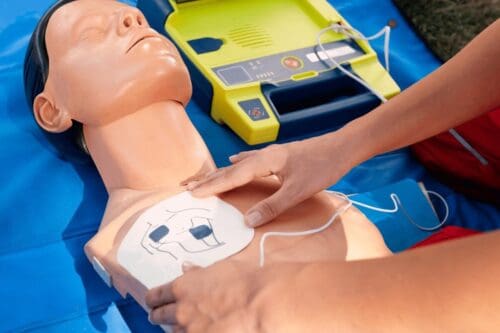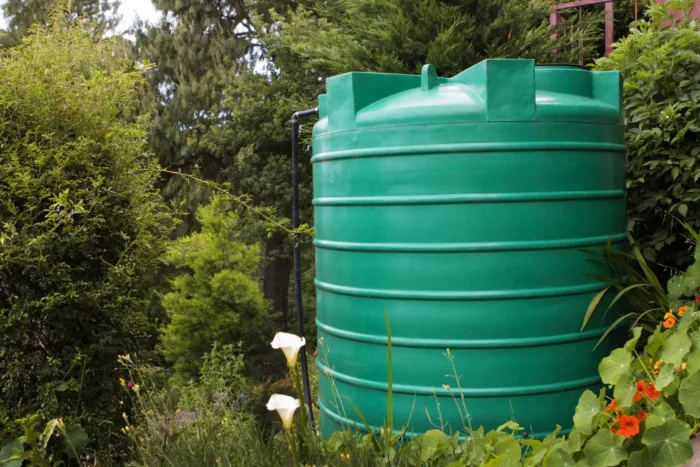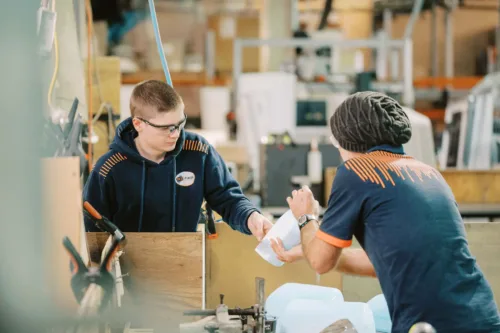

Impact resistance is one of the most important properties to consider when choosing durable plastic material. Just think about the amount of shock boat and truck panels are exposed to on a daily basis. Even common household items like refrigerator crispers need impact-resistant plastic to avoid cracking or shattering. It clearly pays dividends to choose the right impact-resistant plastic for the job.
Want to know which impact-resistant plastic we’d recommend? There are essentially four types that we consider the best cheap and strong plastic on the market. Read on for our thoughts on each one and a closer look at what is durable plastic.
1. ABS
Short for acrylonitrile butadiene styrene, ABS is made by polymerising styrene and acrylonitrile alongside polybutadiene. This process forms chemical chains that bind to each other and create the ultra-strong and durable material known as ABS. Want to know what is durable plastic? Consider this chemical connectivity as a crucial element when choosing durable plastic material for your next project.
Pros of ABS
- Offers excellent strength and impact resistance.
- Ideal for heavy-duty applications.
- Has outstanding thermo formability and low water absorption.
- One of the top-performing plastics in terms of lifespan.
- Excellent chemical resistance.
Cons of ABS
- Isn’t recommended for external use.
- Offers low UV resistance (can be improved if treated with UV-resistant coating).
- Sensitive to solvents and can be damaged by certain substances, such as acetone.
Applications of ABS
Over the past decade, ABS has become one of the most commonly used plastics for 3D printing. The flexibility and strength of ABS have also made it popular for injection moulded part manufacturing.
At BCJ Plastic Products, we really value this impact-resistant plastic. We use ABS when manufacturing automotive, boat and truck panels, power box casings and packaging solutions. Other offbeat applications include poker machine faces, suitcases and decorative panels. Essentially anything that requires durable plastic material.
2. Polycarbonate
Polycarbonate is one of the best impact-resistant plastics available. This tough material is 250 times stronger than glass and 30 times stronger than acrylic. While polycarbonate is the umbrella term, you’ll also see the material sold under trade names such as Lexan, Hyzod and Safeguard.
Pros of Polycarbonate
- One of the top-performing plastics on the market.
- Offers light transmission of 82-86%.
- Has excellent rigidity at high temperatures.
- Built-in flame retardancy.
- Excellent electrical properties.
- Can be treated with UV-resistant coating.
Cons of Polycarbonate
- Poor resistance to some chemicals, particularly alkalis and organic substances (can cause cracking).
Applications of Polycarbonate
Common polycarbonate sheet applications include architectural glazing, machine guards, safety visors, electrical components and barriers. Thanks to its outstanding clarity and durability, clear polycarbonate sheet is often used as a safer and stronger alternative to glass.
3. HDPE
Short for high-density polyethylene, HDPE has excellent impact resistance and high mechanical strength. This highly durable plastic material is also resistant to many solvents. Finally, it’s an efficient electrical insulator, making it great for applications where safety is paramount.
Pros of HDPE
- Excellent abrasion resistance.
- Industry-leading damping properties.
- Resistant to acids, salts, oils, fats, waxes and alcohols.
- Great UV resistance.
- High performance in harsh temperatures.
- Ideal for outdoor applications.
Cons of HDPE
- Can swell and become distorted if exposed to aromatics and halogenated hydrocarbon.
- Sensitive to oxidising agents, such as nitric acid, chromic acid and halogens.
Applications of HDPE
HDPE is an impact resistant plastic used to manufacture water and chemical tanks. It’s resistance to solvents, UV rays and harsh temperatures also helps in this application. HDPE is also used for machine guards and pipe fittings. This takes advantage of its abrasion resistance.
4. High Impact Polystyrene
Also known as HIPS, High Impact Polystyrene is known for its excellent thermoform ability and durability. It’s highly versatile and can be easily moulded and manufactured into a myriad of products. If you’re looking for cheap strong plastic, HIPS might be the one for you.
Pros of High Impact Polystyrene
- Offers first-rate impact resistance and strength.
- Odourless, tasteless and food safe.
- Good dimensional stability and low water absorption.
- High resistance to harsh chemicals.
- It’s a printable plastic, making it great for customisation.
Cons of High Impact Polystyrene
- Minimal UV resistance (not recommended for external use).
Applications of High Impact Polystyrene
High Impact Polystyrene is used extensively in vacuum forming applications, including refrigerator linings. HIPS sheets are typically used for screen printing, signage and POS displays. You’ll also see HIPS used to manufacture food packaging trays, refrigerator shelves and crispers, bathroom cabinets and even toys.
Find the Best Impact Resistant Plastic at BCJ Plastic Products
Are you looking for high impact resistant plastic in Perth? Get a quote online or call us on (08) 9353 3477 for expert plastic fabrication and high quality plastic products.


10 Mind-Blowing Applications of Plastic You Never Knew Existed
Read article

